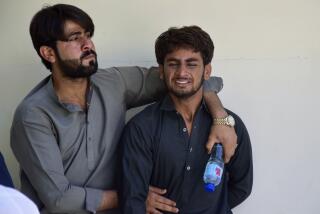Pakistan Bans Public Gatherings
- Share via
ISLAMABAD, Pakistan — Pakistan on Thursday banned political and religious gatherings nationwide, except for Friday prayers, after two devastating attacks killed 70 people within a week.
Interior Minister Aftab Khan Sherpao said the ban had been imposed to prevent further attacks. He did not say how long it would last.
Troops were deployed to keep order in the central city of Multan, where a predawn bombing Thursday killed 39 people and wounded 100.
“I am scared now. How can I send my children to the mosque?” said Ishaq Chaudhry, 42, a grocer.
Two bombs planted in a car and a motorcycle exploded as a gathering of about 3,000 Sunni Muslims was dispersing after prayers for Maulana Azam Tariq, the slain leader of the banned Sunni radical group Sipah-e-Sahaba.
The group was marking the one-year anniversary of his death, which was blamed on Shiite Muslim militants.
A crowd of about 2,000 gathered outside a hospital where victims were taken, shouting slogans against Shiites and the government, witnesses said. They shattered the windshields of two ambulances and burned tires.
About 1,000 police officers were called into the city and soldiers were patrolling to prevent clashes between Sunnis and Shiites. Schools in Multan were ordered closed for two days, said Ijaz Chaudhry, a senior government administrator.
Police also tightened security in other cities. In Karachi, the scene of sectarian attacks and unrest in May, extra police were deployed at mosques.
Sipah-e-Sahaba head Ahmad Ludhianvi blamed Thursday’s bombings on radical Shiites.
Last week, a suicide attacker blew himself up at a Shiite mosque in the eastern city of Sialkot during Friday prayers, killing 30 people. No one claimed responsibility, but authorities suspected that it was retaliation for the death of Al Qaeda operative Amjad Hussain Farooqi, who was wanted for the 2002 kidnapping and beheading of U.S. reporter Daniel Pearl.
Thursday’s attack in Multan appeared to be Shiite radicals’ response to last week’s attack.
The Sunni-Shiite schism dates to the 7th century over who was the true heir to the prophet Muhammad. Most Pakistanis -- roughly 80% Sunni, 20% Shiite -- abhor the violence and live together peacefully.
More to Read
Sign up for Essential California
The most important California stories and recommendations in your inbox every morning.
You may occasionally receive promotional content from the Los Angeles Times.










